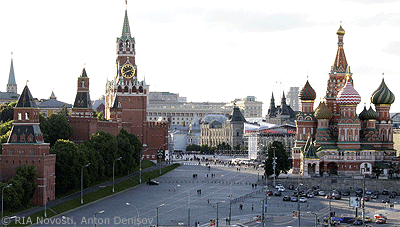Forcing the Vote: Campaign Violations and Reliance on Administrative Resources Highlight Growing Troubles for United Russia
This might be why United Russia is reaching for any and all of its available administrative resources. Just last week, Nezavisimaya Gazeta reported, the National Monitoring Service announced that United Russia has so far collected 968 complaints of campaign violations far ahead of its competitors (the Communist Party came in second, collecting 291). A project co-sponsored by Gazeta.ru and the non-profit election monitoring organization GOLOS even details the number of violations per region. According to its map of electoral violations, the Samara Region, the Stavropol Territory and the city of St. Petersburg have registered the most infractions, with 183, 169 and 138 complaints respectively. Perhaps the most curious of these is the case of regional party officials turning to the Russian Orthodox Church to pitch in for United Russia's electoral campaign. A Volgograd priest, Alexei Pluzhnikov, wrote on his LiveJournal blog that he, along with several other regional clergy, was called to a meeting with a high-ranking local official who told the priests to hint to their parishes that they should vote for United Russia. "You're so nice, so psychologically savvy, so influential...Suggest to your congregation that they need to vote for United Russia," he claimed in his blog the official told them. Local officials, however, were quick to downplay Pluzhnikov's accusation. Volgograd Deputy Governor Oleg Matveychev told Gazeta.ru the gesture was a simple request rather than an order. "There was no pressuring the holy fathers representatives of the district administration just wanted to talk to them about whether they would mind participating in the election campaign in some capacity," he said. Yet other events, too, have been bubbling up throughout the country, drawing more attention to United Russia's dubious campaign tactics. Nezavisimaya Gazeta reported that about 15 Moscow State University students were arrested on Saturday for protesting the school's student union joining Prime Minister Vladimir Putin's All-Russian Peoples' Front without their consent. The paper also reported last week that party officials were even soliciting bedridden patients in St. Petersburg. But are all these moves a sign of desperation, or business as usual for the party of power? Experts said it's both. According to Alexey Mukhin, the president of the Center for Political Information, the party's previously tried-and-true tactics now paint a picture of increasing anxiety against the backdrop of its plummeting ratings. What's more, he said, the party's "brand" is rapidly deteriorating. "It has been used many times already, but now it's getting old," he said. "People are fed up with the fact that United Russia promises many things, but ultimately only supports the interests of one class: the bureaucrats." Others point to the authorities' necessity to rely on administrative resources. Yuri Korgunyuk, a political expert at the INDEM Foundation, said the party has little room for experimenting with other methods because the present tactics form such a significant portion of its foundation. "United Russia was built on and with administrative resources, and functions only through administrative resources," he said. "This series of violations simply shows us that there's nothing else to United Russia besides administrative resources and the monopoly over information on the major television stations just the open violation of the law." Both Mukhin and Korgunyuk agreed that however much Putin attempts to distance himself from United Russia, the party's dropping popularity is as much a reflection of the population's support for him as for his party. "Earlier there was certain stability with Putin, and you could've put him at the helm and he would've carried the entire campaign on his own. But now that doesn't even work just look at how he was booed [in an appearance at Moscow's Olympic Stadium] last night." 
With the Duma elections just two weeks away, recent developments are increasingly suggesting that United Russia is getting nervous ahead of the vote. In the midst of dropping ratings, first came the news that the party of power leads the pack in electoral campaign violations. And just last week, sources claimed regional party members were soliciting the Russian Orthodox Church for votes, among other violations. But is this a sign of desperation, or business as usual?
Russia, Government, Politics, Duma Election - Russian News - Russia - Johnson's Russia List

